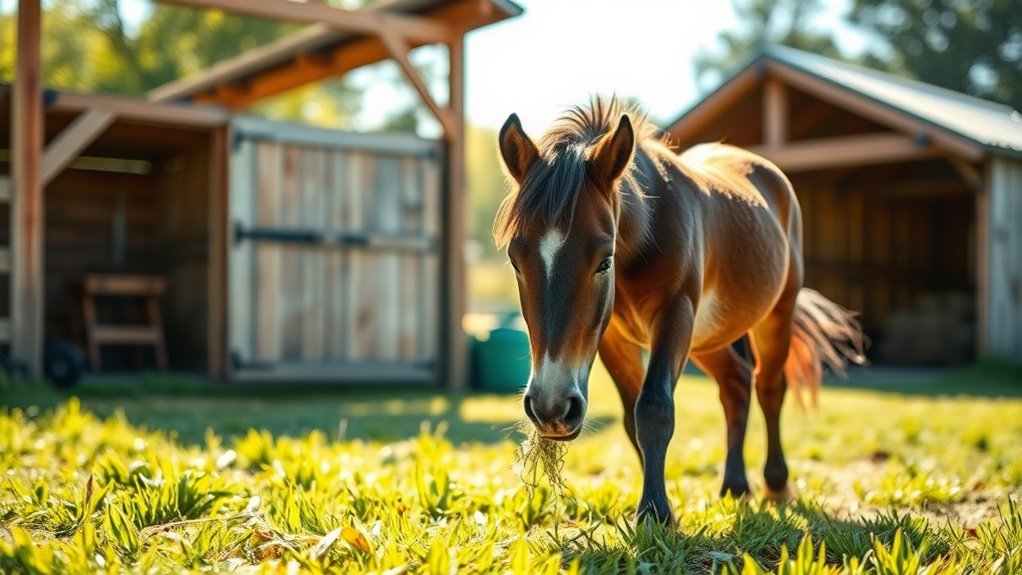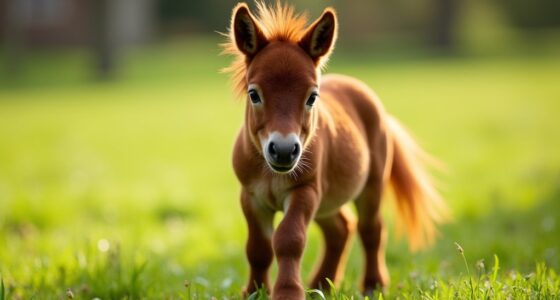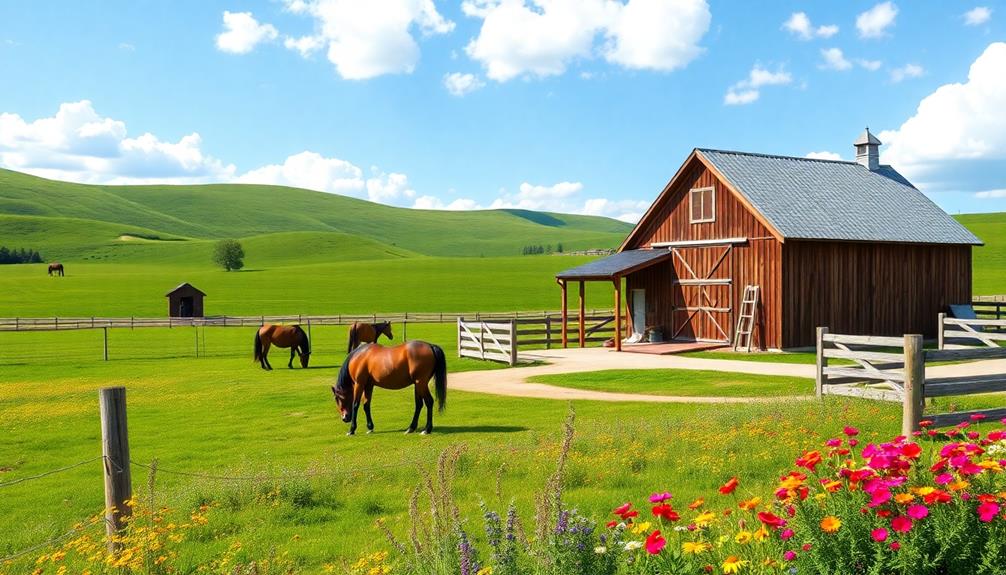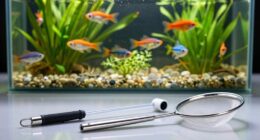To care for your miniature horse, feed a balanced, portion-controlled diet mainly consisting of high-quality hay, small amounts of fortified pellets, and plenty of fresh water. Guarantee they get daily exercise in a safe, enclosed space to keep them healthy and happy. Provide a well-ventilated shelter with bedding to protect from weather and maintain cleanliness to prevent infections. Paying attention to grooming and health checks helps catch issues early—continue exploring to discover more tips on caring for your miniature horse.
Key Takeaways
- Provide a balanced, portion-controlled diet with high-quality hay and minimal sugary treats to prevent obesity.
- Ensure regular, gentle exercise like short walks and play to maintain health without overexertion.
- Offer a clean, well-ventilated shelter with bedding to protect against weather and promote comfort.
- Conduct daily grooming and health checks to prevent skin issues and catch health concerns early.
- Schedule routine veterinary visits, vaccinations, and dental care for overall well-being and longevity.

Caring for a miniature horse requires understanding its unique needs and providing proper attention to its health, diet, and environment. One of the most important aspects is regular horse grooming. You’ll want to brush your mini’s coat frequently to remove dirt, loose hair, and prevent matting. Use gentle brushes to avoid irritating their sensitive skin, and pay special attention to their hooves, which should be picked out daily to prevent thrush and other infections. Grooming isn’t just for cleanliness; it also helps you check for cuts, swelling, or signs of illness early on. Keeping your miniature horse clean and comfortable contributes markedly to its well-being. Consistent grooming also facilitates bonding and trust between you and your horse.
Regular grooming keeps your miniature horse clean, healthy, and allows early detection of health issues.
Veterinary care is equally essential in maintaining your mini’s health. Regular check-ups with an equine veterinarian are indispensable, even if your horse appears healthy. These visits allow for vaccinations, dental examinations, and parasite control, which are all pivotal for preventing disease and ensuring your horse’s longevity. Because miniature horses are more prone to certain health issues like obesity and dental problems, staying on top of veterinary care helps catch issues early before they become serious. Always observe your horse for signs of discomfort, abnormal behavior, or changes in appetite, and consult your vet when needed. Prompt veterinary attention can make a huge difference in your mini’s overall health and happiness. Additionally, monitoring weight and body condition is vital to prevent obesity, which is common in miniature horses. Regular weight management can help maintain their optimal condition.
In terms of diet, you should focus on providing a balanced, portion-controlled feed tailored to their size and activity level. Miniature horses don’t need large amounts of feed; overfeeding can lead to obesity, which is a common concern. Grass hay is typically the foundation of their diet, and it should be high-quality and free of dust and mold. Supplement with small amounts of fortified pellets if necessary, but avoid giving treats high in sugar or starch, such as apples or carrots in excess, as they can cause digestive issues. Fresh water must always be available, and you should monitor intake to ensure they stay properly hydrated. Proper nutrition is essential for maintaining their health and preventing issues related to overfeeding. If your mini is kept outdoors, make sure their grazing area isn’t overgrown or contaminated, as this can lead to parasites or nutritional deficiencies. Regular grazing management can help prevent these problems and promote their well-being.
Providing a comfortable shelter is also critical. Your miniature horse needs protection from extreme weather, whether it’s scorching sun, rain, or cold. A well-ventilated stall or run-in shed offers a safe retreat and reduces stress. Bedding like straw or wood shavings helps keep them dry and comfortable, and it also makes cleaning easier. Remember, a clean environment supports good health and reduces the risk of infections. Good shelter and proper care are vital components of overall well-being. Maintaining proper ventilation in their shelter can further improve air quality and reduce respiratory issues. By paying close attention to grooming, veterinary care, diet, and shelter, you’ll ensure your miniature horse stays happy, healthy, and thriving in its special place in your life.
Frequently Asked Questions
How Often Should I Groom My Miniature Horse?
You should groom your miniature horse regularly, ideally every 1-2 weeks, to keep its coat healthy and free of dirt. Grooming frequency depends on the horse’s activity level and coat condition. Use appropriate grooming tools like a curry comb, stiff brush, and soft brush to remove dirt, loose hair, and prevent skin issues. Consistent grooming also helps you check for injuries or skin problems early.
What Are Common Health Issues in Miniature Horses?
You might think miniature horses are hardy, but they often face health issues like dental problems and hoof care concerns. Regular dental checks help prevent discomfort and eating difficulties, while routine hoof care prevents lameness. Staying vigilant about these common issues guarantees your miniature horse stays healthy and happy. Don’t overlook their unique needs—early detection and consistent care make all the difference in maintaining their well-being.
How Do I Introduce My Miniature Horse to New Environments?
When introducing your miniature horse to new environments, focus on gradual horse socialization and environmental adaptation. Start by letting your horse explore the new space at its own pace, keeping it supervised. Use positive reinforcement to build confidence and reduce stress. Keep the experience calm and consistent, allowing your miniature horse to adjust gradually. This approach helps your horse feel secure and comfortable in unfamiliar surroundings, promoting healthy adaptation.
Can Miniature Horses Be Kept Outdoors Year-Round?
While miniature horses thrive outdoors, you shouldn’t leave them exposed year-round without proper miniature horse housing. Cold, wet, or hot weather can impact their health, so they need an outdoor shelter that offers protection from elements. You’re responsible for providing adequate shelter, ensuring it’s well-ventilated, dry, and safe. Regularly check your miniature horse’s environment to keep them comfortable and healthy, regardless of the season.
What Should I Do if My Miniature Horse Refuses to Eat?
If your miniature horse refuses to eat, you should first observe its feeding behavior closely. It might be experiencing stress, dental issues, or illness. Make dietary adjustments by offering fresh, palatable hay or small amounts of treats. Consult a veterinarian if refusal persists, as prompt action can prevent nutritional deficiencies. Ensuring a calm feeding environment also encourages better eating habits, helping your miniature horse regain its appetite quickly.
Conclusion
Caring for your miniature horse is like tending a delicate yet resilient flower—your attention, love, and knowledge help it flourish in harmony. With a balanced diet, plenty of exercise, and cozy shelter, you nurture its spirit and health, ensuring it remains a vibrant thread in the tapestry of your life. Remember, your gentle stewardship transforms daily routines into a symphony of trust and companionship, making every moment together a treasured melody in your shared story.









